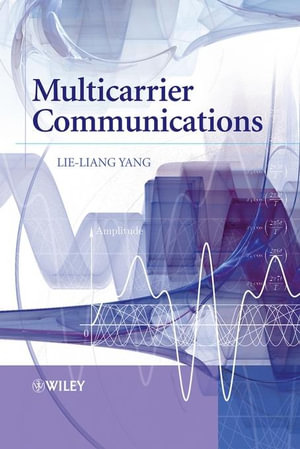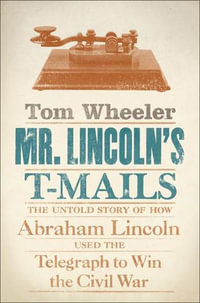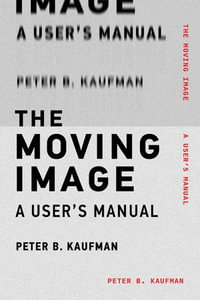
At a Glance
eText
$305.79
or 4 interest-free payments of $76.45 with
orInstant online reading in your Booktopia eTextbook Library *
Why choose an eTextbook?
Instant Access *
Purchase and read your book immediately
Read Aloud
Listen and follow along as Bookshelf reads to you
Study Tools
Built-in study tools like highlights and more
* eTextbooks are not downloadable to your eReader or an app and can be accessed via web browsers only. You must be connected to the internet and have no technical issues with your device or browser that could prevent the eTextbook from operating.
Multicarrier Communications offers comprehensive and in-depth evaluation of numerous topics in the area, covering the fundamental principles of spread-spectrum and multicarrier CDMA as well as more advanced topics such as multiuser detection (MUD), multiuser transmitter preprocessing (MUTP), MIMO and space-time processing. It examines OFDM and various multicarrier CDMA within an unified framework and provides analytical approaches and formulas for error-performance evaluation of numerous multicarrier systems.
- Examines MUD and MUTP in parallel to illustrate the strong duality between receiver optimization and transmitter optimization
- Comprehensively establishes the theory of noncoherent MUD and noncoherent interference suppression
- Details the body of knowledge on MIMO theory and space-time multicarrier communications
- Contains tables, diagrams and figures to illustrate the performance results.
Practicing electrical engineers and researchers in wireless communications will find Multicarrier Communications an invaluable guide. It will also be of interest to senior undergraduate and graduate students on wireless communications courses.
on
1 Introduction.
1.1 Spread Spectrum.
1.2 Orthogonal Frequency-Division Multiplexing.
1.3 Multiple Access.
1.4 Duplex.
1.5 Diversityin Wireless Communications.
1.6 Organization of the Book.
2 Principles of Code-Division Multiple-Access Communications.
2.1 Direct-Sequence Spread Spectrum.
2.2 Multicarrier Spread-Spectrum Communications.
2.3 Frequency-Hopped Spread-Spectrum Communications.
2.4 Time-Hopping Spread-Spectrum Communications.
2.5 Hybrid Direct-Sequence/Frequency-HoppingMultiple-Access.
2.6 Hybrid Direct-Sequence/Time-Hopping Multiple-Access.
2.7 Summary and Discussion.
3 Principles of Multicarrier Communications.
3.1 Introduction.
3.2 Orthogonal Frequency-Division Multiplexing.
3.3 Frequency-Domain Spread Multicarrier CDMA.
3.4 Single-Carrier Frequency-Division Multiple Access.
3.5 Orthogonal Multicarrier DS-CDMA.
3.6 Multitone DS-CDMA.
3.7 Generalized Multicarrier DS-CDMA.
3.8 Time-Hopping Multicarrier CDMA.
3.9 Time-Frequency-Domain Spread Multicarrier DS-CDMA.
3.10 Summary and Discussion.
4 Performance of Multicarrier Systems over Gaussian Channels.
4.1 Introduction.
4.2 Performance of Orthogonal Frequency-Division Multiplexing.
4.3 Performance of Single-User Frequency-Domain Spread Multicarrier CDMA.
4.4 Performance of Single-User Multicarrier DS-CDMA.
4.5 Performance of Single-User Time-Hopping Multicarrier CDMA.
4.6 Performance of Time-Frequency-Domain Spread Multicarrier DS-CDMA Supporting Multiusers.
4.7 Equivalence Between Single-Carrier DS-CDMA and Multicarrier CDMA.
4.8 Summary and Discussion.
5 Performance of Multicarrier Systems over Frequency-Selective Fading Channels.
5.1 Introduction.
5.2 Frequency-Selective Fadingin Multicarrier Systems.
5.3 Intersymbol Interference Suppression: Cyclic-Prefixing and Zero-Padding.
5.4 Generation of Fading Statistics for Multicarrier Signals.
5.5 Performance of Orthogonal Frequency-Division Multiplexing.
5.6 Performance of Single-User Frequency-Domain Spread Multicarrier CDMA.
5.7 Performance of Single-Carrier Frequency-Division Multiple Access.
5.8 Frequency-Domain Equalizationin Single-Carrier DS-CDMA.
5.9 Performance of Single-User Multicarrier DS-CDMA.
5.10 Performance of Single-User Time-Hopping Multicarrier CDMA.
5.11 Performance of Time-Frequency-Domain Spread Multicarrier DS-CDMA Supporting Multiusers.
5.12 Summary and Discussion.
6 Coherent Multiuser Detection.
6.1 Introduction.
6.2 Multiuser Detection in Frequency-Domain Spread Multicarrier CDMA.
6.3 Multiuser Detection in Multicarrier DS-CDMA.
6.4 Multiuser Detection in Time-Frequency-Domain Spread Multicarrier DS-CDMA.
6.5 Summary and Discussion.
7 NoncoherentMultiuser Detection.
7.1 Representation of Discrete Time-Hopping Multicarrier CDMA Signals.
7.2 Noncoherent Single-User Detection.
7.3 Optimum Prior Noncoherent Multiuser Detection.
7.4 Prior Noncoherent Decorrelating Multiuser Detection.
7.5 Prior Noncoherent MMSE Multiuser Detection.
7.6 Optimum Posterior Noncoherent Multiuser Detection.
7.7 Suboptimum Posterior Noncoherent Multiuser Detection in Rayleigh Fading Channels.
7.8 Posterior Noncoherent Interference Cancellation.
7.9 Summary and Discussion.
8 Multiuser Transmitter Preprocessing.
8.1 Principles of Transmitter Preprocessing: An Example.
8.2 Transmitter Preprocessing in Frequency-Domain Spread MC-CDMA.
8.3 Transmitter Preprocessing in Frequency-Domain Spread MC DS-CDMA Systems.
8.4 Relationship Between Linear Multiuser Transmission and Linear Multiuser Detection.
8.5 Extraction of Channel Knowledge for Transmitter Preprocessing in Multicarrier CDMA Systems.
8.6 Summary and Discussion.
9 Multiantenna Multicarrier CDMA.
9.1 Multiple-Input Multiple-Output Communications.
9.2 Spatial Diversity.
9.3 Spatial-Division Multiple Access.
9.4 Performance of Multicarrier CDMA Using Space???Time Coding.
9.5 Time-Frequency-Domain Space???Time Spread Multicarrier DS-CDMA.
9.6 Space???Time MC DS-CDMA over Fast Time-Varying Fading Channels.
9.7 Summary and Discussion.
Bibliography.
Index.
ISBN: 9780470740231
ISBN-10: 047074023X
Published: 21st January 2009
Format: PDF
Language: English
Publisher: Wiley Global Research (STMS)
Edition Number: 1
You Can Find This eBook In

eBOOK
Mr. Lincoln's T-Mails
The Untold Story of How Abraham Lincoln Used the Telegraph to Win the Civil War
eBook
RRP $24.19
$19.99
OFF

eBOOK
RRP $69.92
$55.99
OFF

eBOOK
eBook
$17.99




















